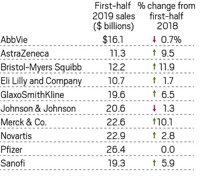Advertisement
Grab your lab coat. Let's get started
Welcome!
Welcome!
Create an account below to get 6 C&EN articles per month, receive newsletters and more - all free.
It seems this is your first time logging in online. Please enter the following information to continue.
As an ACS member you automatically get access to this site. All we need is few more details to create your reading experience.
Not you? Sign in with a different account.
Not you? Sign in with a different account.
ERROR 1
ERROR 1
ERROR 2
ERROR 2
ERROR 2
ERROR 2
ERROR 2
Password and Confirm password must match.
If you have an ACS member number, please enter it here so we can link this account to your membership. (optional)
ERROR 2
ACS values your privacy. By submitting your information, you are gaining access to C&EN and subscribing to our weekly newsletter. We use the information you provide to make your reading experience better, and we will never sell your data to third party members.
Mergers & Acquisitions
Pharmaceutical dealmaking hit a peak in 2018
Changes at drug majors include OTC division sales to focus on innovation
by Rick Mullin
February 6, 2019
| A version of this story appeared in
Volume 97, Issue 6
Mergers and acquisitions in the drug industry last year brought one particularly high price tag: Takeda Pharmaceutical’s $59.0 billion acquisition of Shire. But just as interesting was how 2018’s deal-making reflected a transformation underway among the largest companies, according to new reports by the investment firms HBM Partners and Kurmann Partners.
By HBM’s count, the value of M&A in the sector topped $149 billion, nearly double the value in 2017. The average transaction value rose to $853 million last year from $505 million in 2017, more than recouping the drop from $722 million in 2016.
Top ten
The largest 2018 acquisitions reflect an industry in transition.
| BUYER | TARGET | DEAL VALUE ($ BILLIONS) |
|---|---|---|
| Takeda | Shire | $59.0 |
| GlaxoSmithKline | Novartis, GlaxoSmithKline joint venture | 13 |
| Sanofi | Bioverativ | 11.6 |
| Celgene | Juno Therapeutics | 9 |
| Novartis | AveXis | 8.7 |
| Sanofi | Ablynx | 4.5 |
| Procter & Gamble | Merck KGaA consumer health | 4.2 |
| CVC | Recordati (FIMEI's 51.8% stake) | 3.5 |
| Servier | Shire oncology business | 2.4 |
| Advent International | Zentiva (Sanofi generics) | 2.4 |
Source: HBM Pharma/Biotech M&A Report 2019, Kurmann Partners
Takeda’s Shire purchase was one of three $10 billion-plus deals last year. The others were GlaxoSmithKline’s $13.0 billion buy of Novartis’s stake in an over-the-counter (OTC) drug joint venture and Sanofi’s $11.6 billion acquisition of BioVerativ.
In acquiring Shire, Japan’s Takeda seeks to globalize its business and build a bulwark against the impact of patent expirations. The deal, making Takeda one of the world’s largest drug companies, is fairly typical, as was the run of pipeline deals in 2018. Among them was Celgene’s acquisition of Juno Therapeutics, a specialist in CAR-T cell cancer therapies. The purchase set Celgene up to get bought itself.
The investment firms see divestitures ahead for Takeda in line with changes now underway at companies like Novartis and GSK that acted in 2018 to minimize complexity after their own acquisitions. These companies are focusing on innovative drugs with the offloading of OTC and generics businesses.
GSK was the most active in reengineering last year, merging its OTC business with Pfizer’s in the waning hours of 2018 and then splitting into separate companies focused on innovative drugs and OTC products. The deal was a follow-up to GSK’s acquisition of Novartis’s stake in their OTC joint venture.
Meanwhile, Merck KGaA sold its OTC business to Procter & Gamble for $4.2 billion. A similar deal in the first month of 2019 was Taisho Pharmaceutical’s $1.6 billion acquisition of Bristol-Myers Squibb’s OTC business.
Looking ahead, the Kurmann report anticipates a further large divestment by at least one major drug company. This year, it notes, has already seen one large-scale deal to top the big transaction of 2018: BMS’s acquisition of Celgene announced last month with a price tag of $74 billion and the intent of building a cancer therapy powerhouse.




Join the conversation
Contact the reporter
Submit a Letter to the Editor for publication
Engage with us on Twitter